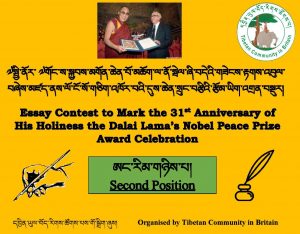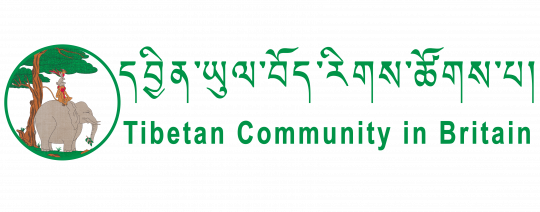
THE SIGNIFICANCE OF NOBEL PEACE PRIZE AWARDED TO HIS HOLINESS THE DALAI LAMA FOR THE TIBET CAUSE
By: Rinzin Tsomo (London Metropolitan University)
I wasn’t even born when the honour of Nobel Peace Prize was awarded to His Holiness the Dalai Lama. But I have celebrated this auspicious day ever since my birth. From the prayer lamp lit up in our prayer room to the school function filled with patriotic songs and fervour speeches. And being born in Tibetan Diaspora is indeed challenging and frustrating in the very beginning. I was tagged as a Refugee and stateless child since birth. Despite my refugee background, I am thankful to born under auspices of His Holiness the Dalai Lama.
It was 30 years ago, on the International Human Rights Day of 10th of December in 1989 that His Holiness the XIVth Dalai Lama was presented with the world’s most notable peace award, the Nobel Peace Prize. It was historical day to the Tibetan people in general and, in particular, to the people across the world who cherish democracy, freedom, peace, and compassion. The award has filled the Tibetans in hope. Despite the fact that the grant award did not cease to attract the world’s attention towards the suffering of this small nation.
Since 1959, His Holiness the Dalai Lama has been persistently bringing the realities of Tibet and Tibetan people to the world attention and has dedicated his whole life for the Tibet cause with the nonviolent and peace. The His Holiness the Dalai Lama is the patron saint of Tibet, reincarnation of bodhisattva of compassion yet he is well known to everyone in today’s world as the epitome of a peace, a Nobel laureate and often stating himself as a simple Buddhist monk. When he was a sixteen-year-old boy, he was called upon to assume full political power due to endanger of Chinese invasion.
Tibet, the roof of the world was known as a forbidden land in world history for its natural and political barrier. This land remained underdeveloped for many centuries, even when the world began to modernize in the sixteenth to eighteen centuries. Tibet’s only interest was protecting its religion and cultural heritage from foreign influence. Since the Chinese occupation, this perpetual land of snow was never the same. Tibet today, is a place with no freedom of speech, religion, or press and arbitrary torture and suppression continues. To express these violations of rights and their suffering to the world, one hundred and fifty-four Tibetans have set their self on fire. With their ablaze bodies of prayer lamps, they called for freedom of Tibet and return of His Holiness the fourteenth Dalai Lama.
Universal recognition for Tibet’s cause was gained when His Holiness the Dalai Lama was awarded Nobel Peace Prize in 1989 for consistently opposing the use of violence and advocating peaceful solutions in order to preserve cultural heritage of Tibet and its social structure. This honour gave unbounded joy to both Tibetans living inside Tibet and in exile. Furthermore, it presented Tibet’s struggle to international prominence.
His Holiness the Dalai Lama has received many awards, honorary doctorates, prizes, etc., in recognition of his message of peace, non-violence, inter-religious understanding, universal responsibility and compassion. Yet the Nobel Peace Prize award is one of the most significant awards since it is internationally recognised award for the advocacy of peace. It also represents the worldwide recognition and support for the just cause of the Tibetan people’s struggle for freedom and self-determination.
The offering of the said award and recognition to His Holiness the Dalai Lama is an action of support to Tibet cause with the deep demonstration of solidarity. At the same time, the historical event has sent a strong and clear message to Chinese government that the whole world is supporting the Tibet cause in spite the economic power of China in this globalised world.
The Nobel Peace Prize 1989 was awarded to His Holiness the Dalai Lama “for advocating peaceful solutions based upon tolerance and mutual respect in order to preserve the historical and cultural heritage of his people.” From this very objective of the award, the non-violence approach to Tibet struggle was identified to the whole world and His Holiness the Dalai Lama as messenger of peace. Moreover, the award also highlights the Tibetan people as peaceful and kind in nature.
In his acceptance speech, His Holiness the Dalai Lama said, “I feel it’s my duty to speak out on their behalf-Tibetan. The Nobel Prize is a prize they well deserve for their courage and unfailing determination during the past forty years of foreign occupation.” From his word, it shows that he is not only representing as an individual, but he is representing for all the Tibetan on the international platform where he covers the Tibet issue from the Chinese invasion period to current situation in Tibet. His representation highlights the Tibet cause in the whole worldwide. It is also the turning point in global acknowledgment of the Tibetan people’s peaceful struggle for freedom. On such enormous platform, he succeeds in highlighting the Tibetan and Tibet cause before everyone. His Holiness has softened the blunt break in our lives and has helped reshape our suffering into something that can contain hope.
In fact, the Tibet issue and Dalai Lama is inseparable. Wherever the Dalai Lama goes, the Tibet issue does follow around. Even in his acceptance speech of Noble Peace Prize award, he reaffirmed his third principal commitment as Tibetan, to strive for Tibet’s struggle and focus on Tibetan people’s hope and trust.
After receiving the historic award, the international support for the Tibet cause was surged, there are not only the flourishment of political support from the other country, but also the economic support was coming forward in assisting the refugee Tibetans in Exile in terms of their livelihood, education and socio-economic development.
In the late two decades, His Holiness has caused the establishment of Tibetan Government in Exile, educational, cultural and religious institutions. He once asserted “The Tibetan Government exist wherever I am”. The statement shows a very strong political remark. To keep the Tibet cause alive, it is very important to have sustainable Government for the preservation of Tibetan unique heritage, identity, culture and tradition.
Internationally, the Chinese Government has denigrated him and even launched a virulent propaganda offensive against His Holiness the Dalai Lama and sought to disrupt and politicise international forums, such as the United Nation, which have challenged China’s human rights record in Tibet. Yet after receiving such recognized award, this concerted effort has had little effect on Tibet cause.
His Holiness the Dalai Lama become an identity to the Tibetan people all across the world. From my experience, since from my college life in India and even in here, people were unfamiliar about the Tibet but when you say, “Dalai Lama is our spiritual leader.” Their responses are like ‘Oh! Yes, a man of peace and Nobel laurate.” He become such an important part in our life even in introducing ourselves to others. The Nobel Peace Prize determines the significance of His Holiness the Dalai Lama in our daily life and somehow, the Tibet cause has been magnified to the global level. Tibetans exist as proud Tibetans under the grace of His Holiness the Dalai Lama.
In a nutshell, the Nobel Peace Prize award to His Holiness the Dalai Lama was great turning point in history of Tibet struggle. It opens to many ways in propagating the Tibet cause on international platform and uplift the Tibetan struggle at the same time.
Since His Holiness the Dalai Lama has spent his whole life for Tibet cause. Now, it’s our duty to contribute and take responsibilities. His Holiness the Dalai Lama has even mentioned in his acceptance speech of Nobel Peace Prize ‘Responsibility does not only lie with the leaders of our countries or with those who have been appointed or elected to do a particular job. It lies with each one of us individually.’ Therefore, we must be aware that our responsibility is getting heavier with the aging of His Holiness. It’s high time that we should integrate our united efforts towards the cause. It is the responsibility of dedicated younger generation to usher it into greater heights of excellence and for the larger interest of the Tibet as a nation.
